UK pledges Somalia aid amid terror threat
In a shift to British policy the UK is set to announce its first aid package to war-torn Somalia amid concerns that the country could harbour al-Qaida militants.

The UK is about to announce its first aid package for Somalia’s transitional government amid mounting concern that without more international support the war-torn country could become a safe haven for al-Qaida.
The aid package is due to be unveiled this week during the first official visit of Sheikh Sharif Sheikh Ahmed, president of Somalia’s “Transitional Federal Government”, who arrived in London on Monday. Britain is understood to be offering £5.5m to improve Somalia’s security, though the details have yet to be announced.
Last week the Home Secretary, Alan Johnson, banned al Shabaab in the UK, making membership a criminal offence.
Britain has the biggest Somali diaspora population in Europe, with Whitehall officials revealing to Channel 4 News last year that up to 70 British Somali nationals were believed to be travelling to Somalia annually for jihadist training. During his visit, Sheikh Sharif is appealing to Somali groups in the UK to help him combat the spread of extremist ideology.
In a speech to the foreign affairs think tank Chatham House last night, the Sheikh warned that there was not enough international support for his attempts to counter the influence of “al Shabaab” Islamist militants, who recently pledged their allegiance to al-Qaida.
“The danger is not confined to Somalia but can reach anybody,” the president said. “The only way to get past this difficulty is to strengthen the government.”
Sheikh Sharif met Gordon Brown for 15 minutes on Monday afternoon, with the prime minister reportedly pressing for more action to secure the release of Rachel and Paul Chandler, the British couple seized by Somali pirates last October.
The case is seen as a test of the Somali president’s ability to influence regional clan networks beyond Mogadishu. Mr Sharif’s forces control an area around the presidential palace in the capital, while much of south and central Somalia is controlled by al Shabaab militants.
Britain has the biggest Somali diaspora population in Europe, with Whitehall officials revealing to Channel 4 News last year that up to 70 British Somali nationals were believed to be travelling to Somalia annually for jihadist training.
“The plan is to bring back law and order,” the president said last night. “So every Somali can participate in free elections. People may think that is a tall order, but I believe we can achieve this.”
Gordon Brown’s decision to shore up the Sharif administration marks a shift in British policy after an internal Foreign Office review.
The Americans have gone further, providing Sharif with weapons. According to a report in Saturday’s New York Times, Washington is covertly advising Sharif’s forces on a forthcoming offensive against al Shabaab. Though some western diplomats fear that the soft-spoken school teacher turned president may turn out to be a “false dawn” with no vision for a united country after two decades of civil war.
Any aid to Sharif could be construed by his enemies as proof that he is nothing more than a western puppet. And there is a risk that military hardware could end up on the wrong side in the conflict, as Somali warlords switch sides.
“They need a national army which is properly trained, fed and paid”, a western diplomat said. “And the government needs to show us it has a vision for the future.”
Britain will also announce an extra £7.5m in humanitarian support, though British officials say the money will not be channelled through the biggest aid agency in Somalia, the UN World Food Programme (WFP).
A Channel 4 News investigation last year revealed that WFP aid was being diverted by Somali businessmen and sold in the market of the capital, Mogadishu. Though the WFP denied any wrongdoing, the UK and USA have refused to renew their funding pledges. Islamist militants in Somalia have ordered the WFP to stop working there.